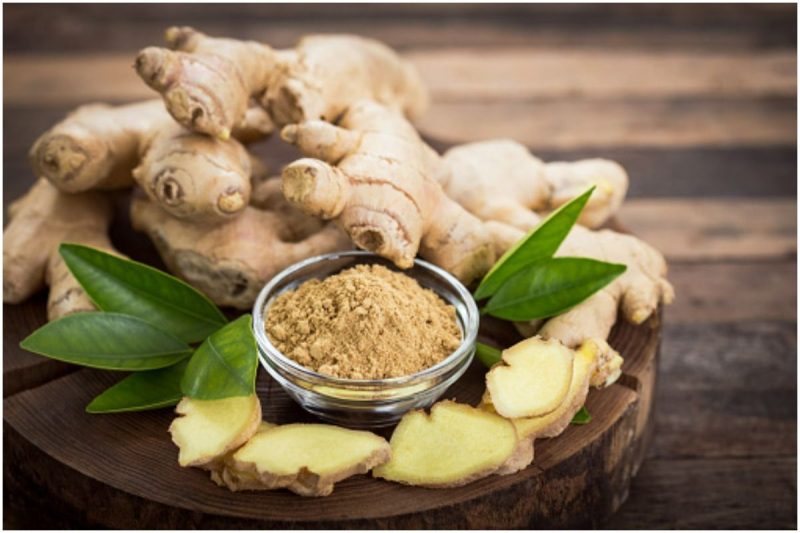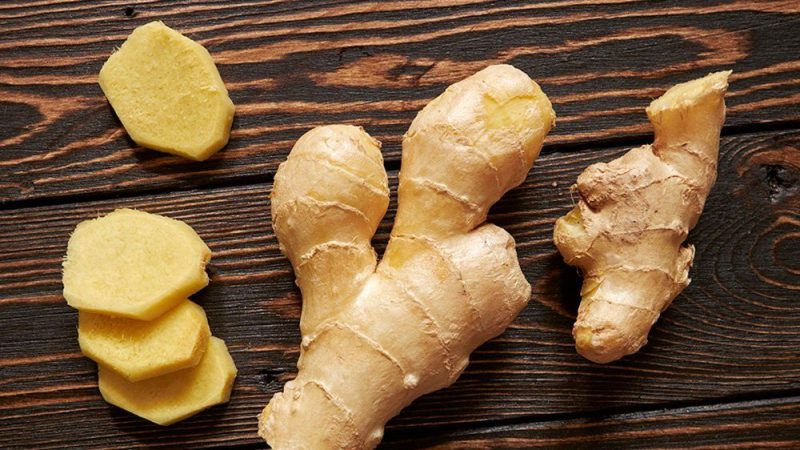 The benefits and contraindications of ginger have been widely documented. With the scientific name Zingiber officinale, this natural spice has been used since ancient times as an ally to promote well-being. There are current studies that support many of its properties.
According to information published in the book ‘ Herbal Medicine: Biomolecular and Clinical Aspects,’ the plant is a member of the Zingiberaceae family, which includes cardamom and turmeric. Specifically, it is valued for its abundant concentration of gingerols, compounds that account for many of its positive health effects. Do you want to know more about it?
The benefits and contraindications of ginger have been widely documented. With the scientific name Zingiber officinale, this natural spice has been used since ancient times as an ally to promote well-being. There are current studies that support many of its properties.
According to information published in the book ‘ Herbal Medicine: Biomolecular and Clinical Aspects,’ the plant is a member of the Zingiberaceae family, which includes cardamom and turmeric. Specifically, it is valued for its abundant concentration of gingerols, compounds that account for many of its positive health effects. Do you want to know more about it?
Contents
Nutritional properties of ginger
Before knowing in detail the benefits and contraindications of ginger, it is worth doing a brief review of the nutrients it concentrates. According to the United States Department of Agriculture (USDA) database, every 100 grams of this root provides the following:- Calories: 80.
- Total fat: 0.8 g.
- Saturated fatty acids: 0.2 g.
- Cholesterol: 0 mg.
- Sodium: 13mg.
- Potassium: 415 mg.
- Carbohydrates: 18 g.
- Dietary fiber: 2 g.
- Sugars: 1.7 g.
- Proteins: 1.8g.
- Vitamin C: 5 mg.
- Calcium: 16 mg.
- Iron: 0.6 mg.
- Vitamin D: 0 IU.
- Vitamin B6: 0.2 mg.
- Vitamin B12: 0 µg.
- Magnesium: 43mg.
- Gingerol.
- Paradol.
- Shogaol.
- Zingerone.
- 1-Dehydro-10-gingerdione.
- Terpenoids.
- Flavonoids.

13 health benefits of ginger
Due to its abundant concentration of active compounds, ginger can be used to improve health. Although it is not a first-choice treatment against diseases, it is a good complement to reduce certain symptoms and risks. Next, we detail its main uses.1. Nausea relief
One of the most recognized benefits of ginger is nausea relief. Its consumption in infusion or extracts reduces this annoying symptom, especially in the first months of pregnancy. In this regard, a review published in Nutrition Journal reported that 1.5 grams of ginger helped reduce morning sickness in pregnant women. Specifically, this is believed to be due to its ability to increase digestive responsiveness and stimulate gastric emptying. Even so, its consumption is not recommended in the last stage of pregnancy or for women with a history of abortion. However, in other research, this spice also positively calms chemotherapy-related nausea. In any case, more studies are necessary to verify these effects.2. Prevention and relief of flu and colds
In natural medicine, ginger is a widely used remedy to combat flu or cold symptoms. In an investigation shared in the Journal of Ethnopharmacology, it is highlighted that this plant has antiviral properties that help reduce upper respiratory tract viral infections.3. Stimulation of digestion
Beyond relieving nausea, evidence suggests other benefits of ginger for digestive health. In particular, it seems to help combat constipation and intestinal gas formation. A publication in the World Journal of Gastroenterology reported that ginger has the potential to stimulate gastric emptying and antral contractions in patients with functional dyspepsia.4. Relief of joint pain
Gingerol, the main active compound in ginger, has anti-inflammatory and analgesic effects. Due to this, it is used in the treatment of joint diseases. On this, a meta-analysis shared in Osteoarthritis and Cartilage reported that eating up to 1 gram of ginger can decrease pain and disability in patients with osteoarthritis.5. Control of high glucose levels
A study shared through the Iranian Journal of Pharmaceutical Research revealed that this spice has the potential as an antidiabetic. Specifically, patients who took 2.2 grams of ginger powder daily reported a decrease in blood sugar levels by up to 12%. Similar results were reported in a more recent study, in which patients with type 2 diabetes experienced reduced glycosylated hemoglobin (HbA1c). For now, this area of research has been little explored, so more evidence is required.6. Strengthening the immune system
The immunomodulatory qualities of ginger are not only used as allies against respiratory diseases. Its active compounds also help strengthen defenses against other infectious agents that cause diseases. Due to its anti-inflammatory activity, it even has positive effects against autoimmune disorders.7. Stimulation of weight loss
It is not a miraculous ingredient against overweight and obesity. Even so, its inclusion in a healthy and varied diet can benefit weight loss. A 2019 review of the literature reported that ginger supplementation provided the following benefits in people with excess weight:- Body weight reduction.
- Decreased waist-hip ratio.
- Reduced hip ratio.
8. Relief of menstrual pain
One of the traditional uses of ginger is to relieve menstrual pain. Thousands of women have prepared its infusion and extracts against this ailment for years. Some studies support this use. For example, the Journal of Alternative and Complementary Medicine revealed that ginger managed to reduce dysmenorrhea with the same effectiveness as the two NSAIDs.9. Heart health protection
There are several reasons why ginger may help protect heart health. One of them is its ability to stimulate the control of lipid levels in the blood. In research shared in Clinical & Medical Biochemistry, patients given 5 grams of ginger powder for three months experienced a 17.4% drop in their LDL (bad) cholesterol levels. However, moderate consumption of this spice is also associated with lower blood pressure, better blood circulation, and, in general, less risk of chronic heart disease.10. Improves brain function
Ginger’s concentration of antioxidants helps reduce the buildup of free radicals. In turn, this has a positive effect on brain health. A study shared in Evidence-Based Complementary and Alternative Medicine suggests that daily doses of ginger extract improve cognitive functions. In particular, women who received daily supplementation with this spice improved reaction time and working memory. Similarly, it is believed to prevent age-associated cognitive decline.11. Antitumor properties
Ginger is not a cancer treatment. However, researchers have studied the effects of its active compounds on some forms of cancer. Thus, [6]-gingerol was found to have antitumor effects. To be more precise, it is associated with the inhibition of tumor cell growth in the following forms of cancer:12. Stress relief
Ginger has been listed as an adaptogenic food. This means that its consumption helps to restore the energy level after going through episodes of stress. In addition, it generally contributes to better physical and mental performance.
13. Prevention of gum infections
The antimicrobial properties of ginger are useful for the protection of oral health. As detailed in a study shared in Phytotherapy Research, gingerol was shown to be effective in stopping the growth of oral bacteria such as Porphyromonas gingivalis, Porphyromonas endodontics, and Prevotella intermedia that cause periodontal infections.Ginger contraindications
Side effects from ginger consumption are not common. They are often experienced after ingesting more than 4 grams per day. These reactions may include the following:- Heartburn.
- Gases.
- Stomachache.
- Burning in the mouth.
1. When taking anticoagulants
In general, anticoagulants are indicated to prevent thrombi from forming in the blood, for example, warfarin, heparin, and rivaroxaban. In the case of being treated with these drugs, it is not convenient to ingest ginger. For what reason? Since its active compounds have a similar mechanism of action to these drugs, simultaneous intake may be dangerous. Specifically, the risk of bruising or bleeding is increased. A recent study published in Current Drug Metabolism reported that ginger inhibited platelet aggregation. This effect explains the interaction of the root with warfarin and other anticoagulant drugs.2. During the last stage of pregnancy
While in the first weeks of pregnancy, ginger helps to alleviate nausea; in the last stages before delivery, it is not recommended. According to what was reported by the Canadian Family Physician, at this time of pregnancy, it can pose an increased risk of bleeding. It should not be taken if there is a history of coagulation problems, abnormal vaginal bleeding, or miscarriage. For a safe intake, it is best to see a doctor.3. When consuming drugs for hypertension
While it is true that ginger has benefits for the prevention of heart disease, it also has contraindications for patients already diagnosed with hypertension. For what reason? This is because it blocks calcium channels. When this mineral cannot enter the blood vessels, vasodilation occurs, and pressure decreases. If you are taking medication to lower your blood pressure, lowering your blood pressure can be dangerous. Therefore, it is better to avoid their intake altogether.4. Treatments for diabetes
Similar to the previous cases, the simultaneous taking of ginger with drugs to control diabetes is not recommended. Due to its antidiabetic qualities, it can lead to a considerable drop in glucose levels ( hypoglycemia ). In any case, it is something that can be assessed in the company of the doctor.5. Hemophilia
People with hemophilia tend to bleed for long periods because they do not have a clotting factor to control that bleeding. By stimulating blood circulation, ginger could cause unwanted effects in these patients.6. Heart problems
Despite the benefits it confers on heart health, excessive or prolonged intake of the plant is not recommended, especially if there is a history of heart disease. According to the American corporation WebMD, high doses of this plant can worsen certain heart diseases, such as arrhythmias.7. Gallstones
Although evidence regarding its effects on the gallbladder is lacking, ginger is not recommended for gallstones. It is feared that it may be harmful because the plant stimulates bile secretion.How to consume ginger safely?
With the benefits and contraindications of ginger clear, it’s time to learn how to safely consume this root. Right now, buying it fresh to prepare infusions or dishes is possible. In addition, it is found in different presentations, such as the following:- Liquid extracts.
- Oil.
- Dust.
- Capsules or tablets.
